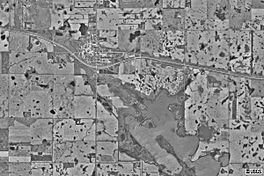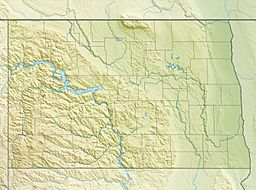Lake Ibsen facts for kids
Quick facts for kids Lake Ibsen |
|
|---|---|

To the southeast of Leeds
|
|
| Location | Benson County, North Dakota, United States |
| Coordinates | 48°15′37″N 99°24′04″W / 48.26028°N 99.40111°W |
| Primary inflows | Little Coulee |
| Primary outflows | Little Coulee |
| Basin countries | United States |
| Max. length | 4200 m (13,780 ft) |
| Max. width | 2100 m (6890 ft) |
| Surface elevation | 454 m (1489 ft) |
| Islands | The Island (peninsula) |
| Settlements | Leeds |
Lake Ibsen is a small, interesting lake located in Benson County, North Dakota, in the United States. It's a natural body of water that plays a part in the local environment. This lake is known for being near the town of Leeds.
Contents
Discover Lake Ibsen
Lake Ibsen is a freshwater lake. It's a place where water collects in a natural dip in the land. Lakes like Ibsen are important for many reasons. They provide homes for wildlife and can be places for people to visit.
Where is Lake Ibsen Located?
Lake Ibsen is found in the state of North Dakota. Specifically, it's in Benson County, North Dakota. If you look on a map, you'll find it southeast of the town of Leeds. This area of North Dakota is known for its many small lakes and wetlands.
How Big is Lake Ibsen?
Even though it's called a "small" lake, Lake Ibsen is still quite large! It stretches about 4,200 meters (or 13,780 feet) long. That's more than 4 kilometers! The lake is also about 2,100 meters (or 6,890 feet) wide. This means it's about half as wide as it is long.
The surface of Lake Ibsen is about 454 meters (1,489 feet) above sea level. This measurement is called its elevation. It helps us understand how high the lake is compared to the ocean.
The Water's Journey
Water is always on the move, and Lake Ibsen is part of a larger water system. A stream called Little Coulee is very important to the lake. Little Coulee flows into Lake Ibsen. This means it brings water from other places.
Before reaching Lake Ibsen, the Little Coulee stream starts at Hurricane Lake. After passing through Lake Ibsen, the same stream, Little Coulee, flows out of the lake. It then continues its journey to Silver Lake. This shows how lakes are often connected by streams and rivers, forming a network of water.
A Name from History
Lake Ibsen got its name from early settlers in the area. These settlers were Norwegian people who came to live in North Dakota. They brought their culture and names with them. Naming places after their homelands or important figures was a common practice. This helps us remember the history of the people who first settled in a region.
Images for kids
 | Chris Smalls |
 | Fred Hampton |
 | Ralph Abernathy |




